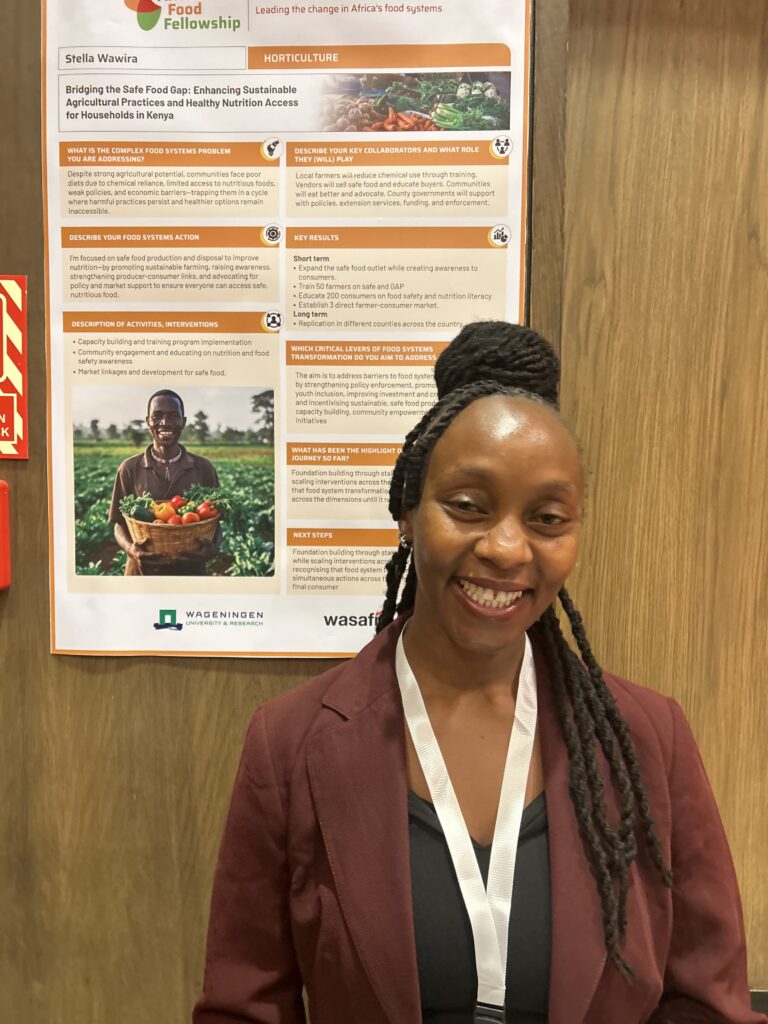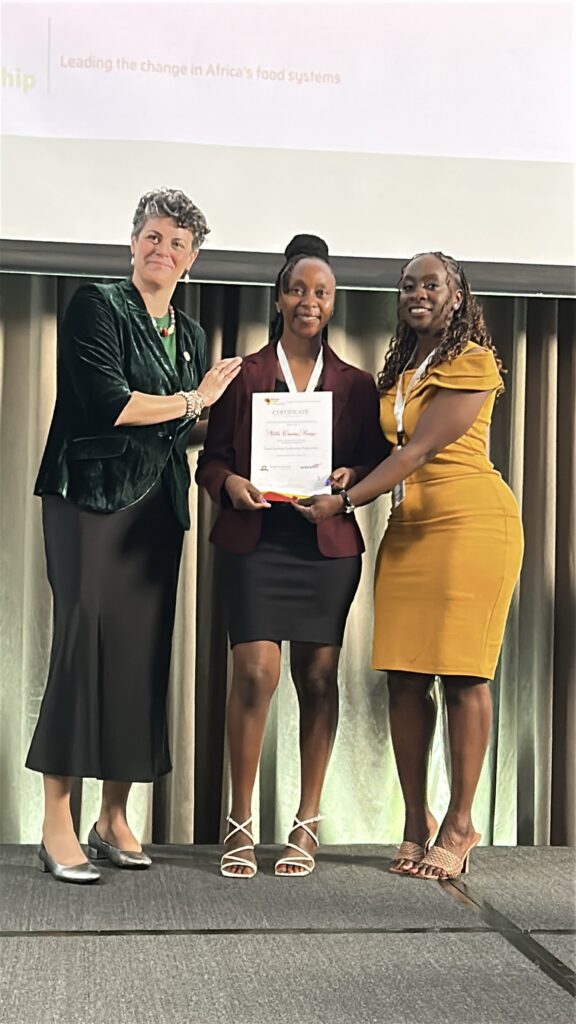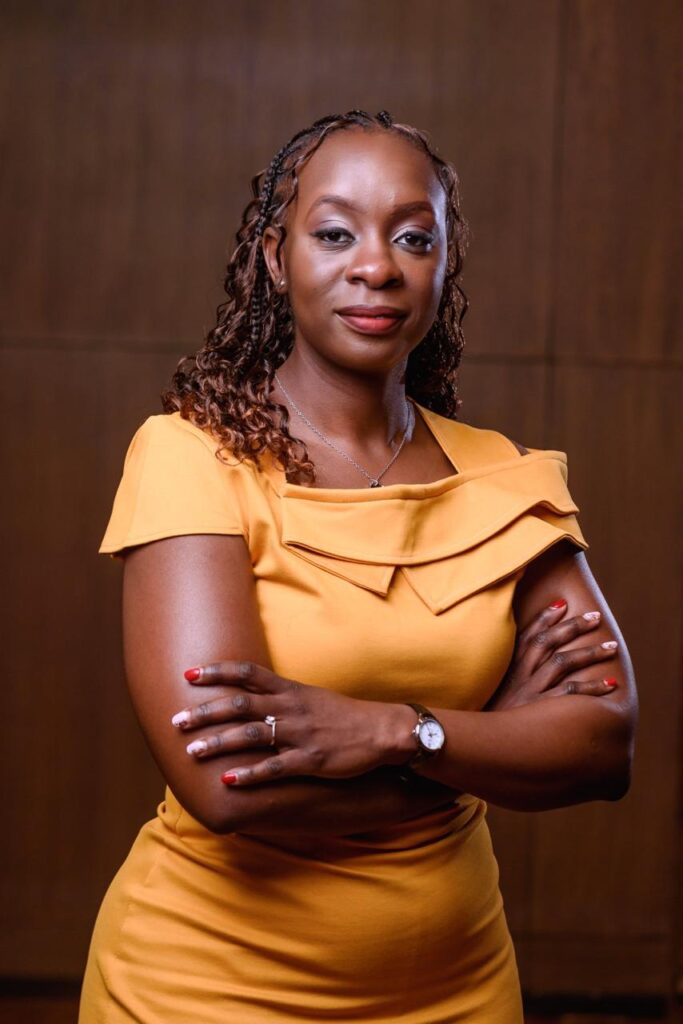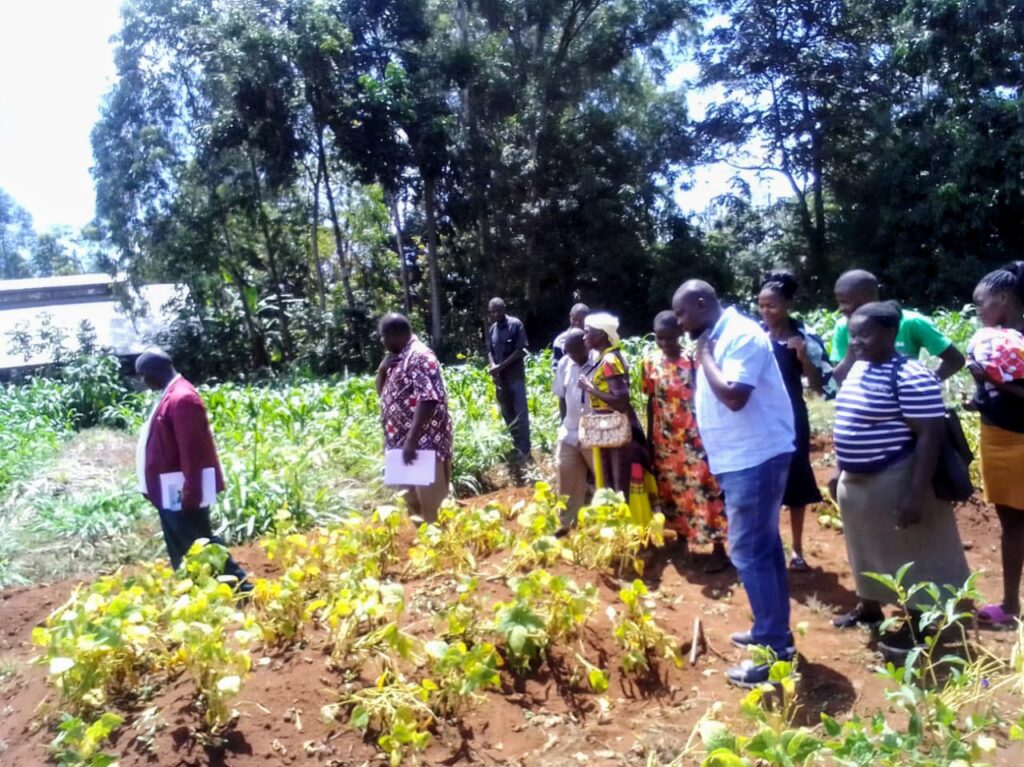By Melisa Mong’ina
In a country where diet-related illnesses and malnutrition remains a pressing public health concern, Stella Wawira, an agronomist and African Food Fellow is creating a new path towards a more safer and nutritious food.

With over eight years of experience working directly with farmers, Stella has dedicated her career to improving food safety and promoting sustainable farming practices that benefit both producers and consumers.
Over the past three years, her projects focused on bridging the gap between farmers and consumers, inspiring her to start an agricultural vending business, dealing in bananas, avocados, onions, tomatoes, garlic, and some vegetables.
“I have been doing projects that bring farmers and consumers together. This led to the opening of my agri-products business that I knew where I was sourcing from,” she says.
Her involvement in agricultural projects and collaborations with organisations like Global Alliance for Improved Nutrition (GAIN), which fight malnutrition, sparked the idea for her Food System Action (FSA) project with the African Food Fellowship (AFF), focusing on food security and safety.

“When I joined AFF and we were tasked with FSAs, the first thing that came into my mind was how we can find solutions to this rising burden of unsafe food. As a vendor, I must be very sensitive with who is consuming my product and where my products are coming from,” explains Stella.
She realized the importance of knowing exactly where and how the food she sold was produced. She now collaborates with three key farmers, making it easier for her to know what her customers consume.
“My concern grew as we were talking about sustainable farming, organic farming, health issues, and malnutrition. I decided to take the route to safe food gap, and currently, I’m working with different farmers in my value chain,” she says.
Stella now collects produce directly from farms, maintains close working relationships with farmers, and partners with almost 20 other vendors who share her goal of reducing unsafe food.
“The journey to safe food is not easy. There is a lot of contamination along the way, so I have decided to shorten the gap between producer and consumer by dealing directly with the farmers. I also collaborate with vendors who share the exact aim,” adds Stella.
According to GAIN, Kenya faces a triple burden of malnutrition—undernutrition, micronutrient deficiencies, and overnutrition. Only 5.2% of adults consume the recommended five daily servings (about 400 g) of fruits and vegetables.
At the same time, approximately 1 in 4 adults is overweight or obese, a factor that contributes significantly to the rising prevalence of diet-related non-communicable diseases (NCDs) such as diabetes, hypertension, and cardiovascular diseases.
GAIN also links unsafe food and unhealthy diets to both acute foodborne illnesses and long-term health risks. These findings motivated Stella to educate her customers about the importance of consuming safe food.
“GAIN data made me think of how I should share the knowledge I have with others. I tried to explain to my consumers the importance of taking safe food, its roots, and the consequences of unsafe food,” she says.
Her efforts not only gained her loyal customers but also made people more conscious of the origins and handling of the food they consume.
Stella has now partnered with the Nairobi County Government on a produce traceability project, working with vendors in markets like Marikiti to trace produce back to farms and assess production practices.
She has declared herself a “Food Safety Ambassador,” planning to expand by opening more stalls and continuing to advocate for safe food.
“The rate at which diseases and disorders are emerging due to unsafe food and diet-related issues is alarming. This has made me to proclaim myself a food safety ambassador,” she declares.
Stella explains that the harmful use of chemicals stems from lack of awareness and the rush for quick profits. She now trains farmers, especially in Nakuru, on sustainable farming methods that use minimal chemicals.
“Most farmers harvest food before chemicals have cleared because of their greed for money. But now, we are building their capacity to adopt sustainable practices,” explains Stella.
She aims to reach more farmers and expand into other counties driven by the value in protecting her customers and not prioritizing money.
“Change is not easy, but farmers are willing because they have seen the benefits. I hope to reach even more farmers, work in different counties, and advocate for safe food consumption,” she says.
Initially, it was all about profits for Stella, but through the AFF and the FSA process, she now sees value in prioritising her consumers’ health.
“I only saw consumers as my source of income. But now I see the importance of taking care of them, because if you lose one, you also lose your income,” she stresses.
The African Food Fellowship’s Role in Building Leaders to Transform Food Systems
Brenda Mareri, Kenya Country Lead for the African Food Fellowship (AFF), explains the fellowship’s goal in developing a critical mass of leaders across food systems who can think systemically about food issues.

“The genesis of this fellowship was due to a gap in food systems. The gap was not technical abilities, policies, or implementations. It was on having leaders who can guide implementation, design, and development of initiatives that can be sustainable and shift food systems,” Mareri says.
The fellowship began in 2020 with 28 fellows and has since graduated four cohorts in Kenya, totaling nearly 150 fellows. Rwanda also runs the program and has about 120 fellows. Participants are drawn from agri-finance, horticulture, and aquaculture sectors.
“We’ve just graduated our fourth cohort this year of around 32 African Food Fellows in Kenya. Over the past four years, we’ve seen tremendous growth in the fellowship,” she notes.
Mareri acknowledges the challenge of managing a network made up of diverse professionals, ranging from researchers and influencers to government and private sector actors.
“Balancing different people with different personalities, goals, and objectives is never easy. AFF offers a common space where these individuals leave behind their logos, brands, and organizations to work together sharing a common goal of changing how food systems operate,” she explains.

She shares examples of successful outcomes. In aquaculture, fellows have advocated for fish food policies, while in horticulture spaces, they have used fellowship modules to redesign programs.
“One of our modules called Foresight, helps fellows to envision the future, applying tools and techniques needed. Some have used this module in counties such as Nakuru, Turkana, and Samburu, to help governments create strategies to shift food systems,” Mareri says.
She emphasizes that the fellowship only focuses on long-term change and not quick fixes. Unlike many leadership programs that end after training, AFF maintains an active alumni network where fellows can reconnect, seek partnerships, and collaborate.
“When it comes to systems work, we’re looking for lasting sustainable outcomes that will actually propel us into the future. After the fellowship, we still create a space where fellows can still return and receive assistance,” she adds.
Mareri stresses that AFF is not a funding body but a catalyst that helps initiate projects and supports further growth.
“We’ve recently launched a Futurism Action Fund, offering small grants offered to graduates to kickstart some of their projects,” she says.
Looking ahead, AFF plans to expand into Zambia, Uganda, and a West African country. By 2030, the program aims to have 1,000 fellows across Africa.
“We are planning to expand to three other countries, and our goal by 2030 is to have more fellows across the continent,” Mareri confirms.
Although the fellowship is a paid program, AFF offers scholarships for those unable to pay the full fee. For the recent cohort, the fee was $1,000, but subsidies were provided where necessary.
Mareri highlights that the program offers valuable networking opportunities and long-term impact through graduations and events like the Transform Food Festival.
“We don’t ideally provide any financial assistance but we create platforms where fellows can interact with others and tap into their thoughts,” she explains.
The African Food Fellowship is more than a training program, it is a growing movement of food system leaders across Africa. Through systems thinking, continuous support, collaboration, and catalytic funding, it empowers individuals to initiate sustainable change within their communities and beyond.
